
Search for Death Records in California
Free California Death Records Lookup

We receive referral fees from partners (advertising disclosure)
The information we provide you is free of charge and a result of extensive research by our product experts. We use affiliate links in our site that provide us with referral commissions. While this fact may not influence the information we provide, it may affect the positioning of this information.


Use our ultimate guide to California death records to see how you can find those records and what they will tell you about the deceased and their life.
Death Records in California -
The Ultimate Guide 2024
- UPDATED July 2024
When someone you love passes away, you have many things that you need to do right away such as planning their funeral and telling your family and friends. You may not realize that you also need their death records. Let’s say that you need to tell the bank that you inherited their house and will take over the mortgage. Lenders require a copy of the deceased’s death certificate for this task. You may need a copy of the certificate to transfer their vehicles and get their life insurance benefits.
Death certificates are also required for probate court. California requires that you go through probate if the deceased’s estate has a value of $166,250 or more.
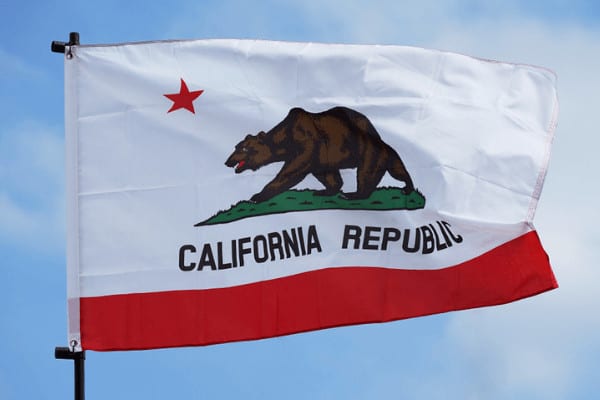
You can skip probate if the estate has a lower value or all of the deceased’s assets go to their surviving spouse. Probate often takes six months to a year and allows the executor to complete the wishes outlined in the deceased’s will. There are many other reasons why you might need a death record in California. We’ll show you how to find those records in the Golden State.
What Are Death Records?
Death records are official documents that provide information about a deceased person. They provide tons of information for those doing genealogical research because you can learn more about your ancestors. You will find these records held by the state where the deceased lived and died but not in their burial state.
If you have an ancestor who lived in San Francisco but was buried in Lexington, you need to look for their death records in California and not Kentucky. Both churches and cemeteries have these records as do state governments. Most records list the date of birth and date of death of the deceased along with their final resting spot and full name.
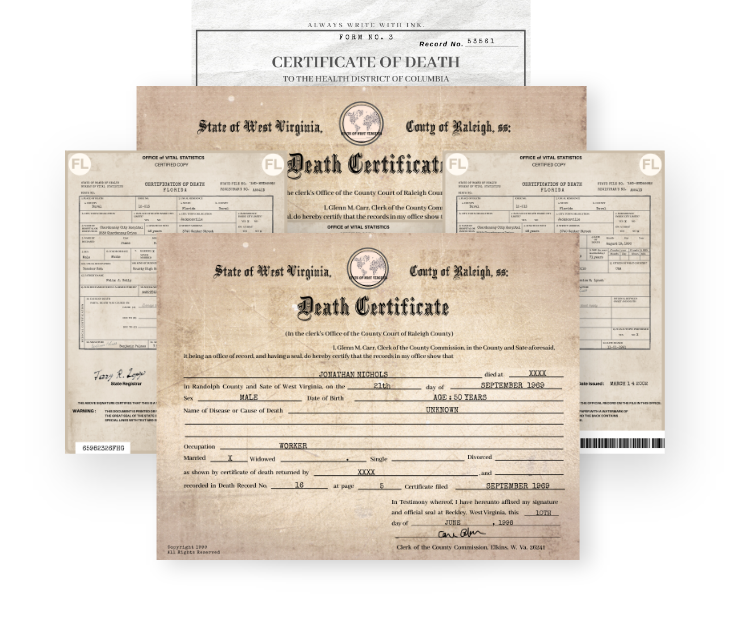
Death certificates are different from death records. An informant usually provides all the information on the form. This often falls on the family or next of kin. The coroner will then fill out other information such as the time and cause of death. In the days after the deceased’s death, you should get a copy of the certificate from the funeral home, which allows you to get multiple copies. California also offers death certificates online.
Why Do States Keep Death Records?
There are a few reasons why states keep and maintain death records. The biggest reason is that it shows the individual passed away. It lets the state know that it needs to take the person off the voting register. The record also comes in handy when someone complains about the deceased’s property. A neighbor might contact the city because they see trash outside the home or notice that no one cut the grass. The state can let the city know that the individual passed away, and the city will then tell the neighbor.
States also maintain death records to help with court cases. Not everyone who passes away will leave behind a will, which can cause disputes between family members. A death certificate helps you handle some of your family’s affairs. It helps you notify the Internal Revenue Service (IRS) and file the deceased’s taxes the next year. You can also use it to transfer the deceased’s property into your name or the names of other loved ones. The certificate is required to open a probate case. California also keeps track of death records as a way to track certain diseases and conditions that affect the population.
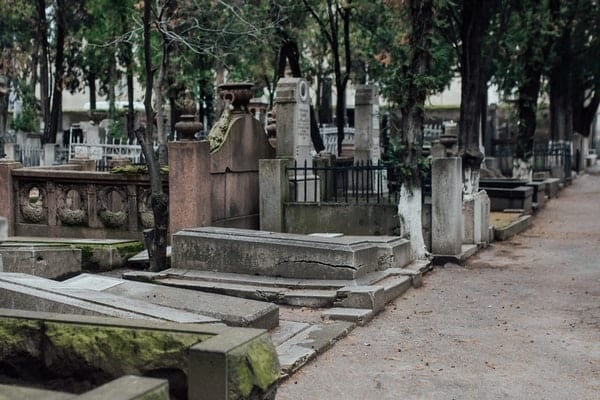
Claiming Unclaimed Property in California
California includes death records in its vital records archive. While the general public can usually access those records, not all certificates and documents are available online. Many records are only available for the deceased’s immediate family members or their next of kin. You may need to show that you have written authorization from the deceased’s family to view the records. California often limits access to modern records and may not allow you to view those records until several years after the person passed away. Older records are usually easier to find from different sources.
Sources for Death Records
How to Find California Death Records
The best place to find California death records is at Archives.com. This site gives you complete access to California death records once you sign up for an account.
Step 1: Navigate to the Archive.com sign in page. You need to enter both the email address and password that you chose. If you do not have an account, click on the link at the bottom of the page to sign up for one.
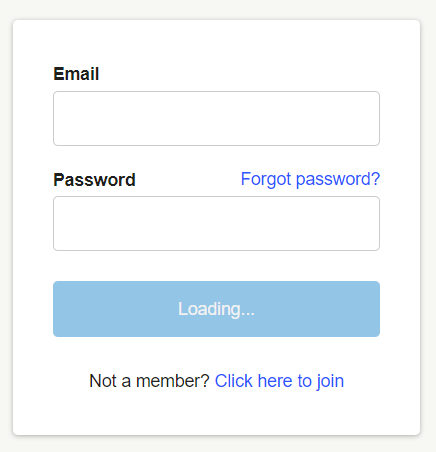
Step 2: Look at the buttons located across the top of the page. Click on the “Search” button to load the page that lets you look for California death records.

Step 3: Check the buttons on the left side of the page. Though the site offers several options, you want to look for “Vital Records,” which has a “Death” button below. Click on this button to tell the site that you only want to view death records.
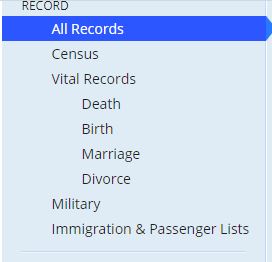
Step 4: Add as much information as you have. You can perform a basic genealogical search with just the last name of your ancestor. Click on the “Exact” box if you only want the site to look for records that match the exact name you entered. You can skip this step if you want to view the death records of people with similar names. The site allows you to add the deceased’s middle and/or maiden names, too.

Step 5: Type “California” in the “Location” box. As you start typing the state name, the site will find an exact match for you. There are options for adding a birth and/or death year and adjusting the dates that you selected. This comes in handy if you aren’t certain of the year. We recommend that you search through all collections. If you know where the records are, you can look through specific collections. Hit the blue “Search Now” button to find the records.

Step 6: Browse the records to find the person and records that you want to view. Most records show the birth and death dates of the deceased but may also include the location where they died as well as where they were buried. Look at the “Collection” section to see what archive has the record. You will often find that many come from the Find A Grave website.
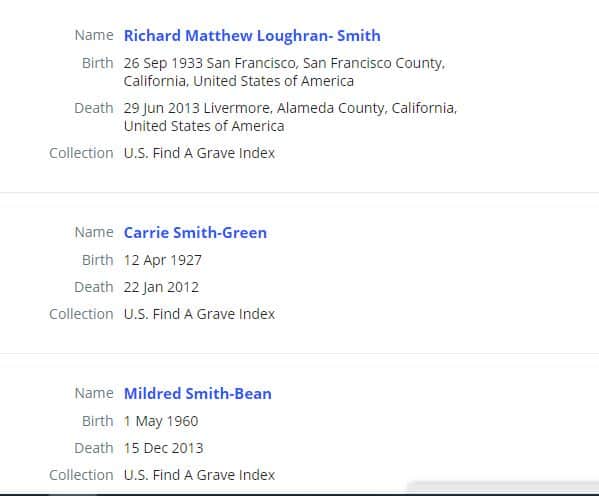
Step 7: Click on the individual’s name to view the basic death record that is available online. This usually shows you the person’s full name and their maiden name if they were married. It also shows you where they were buried or cremated and if a bio is available. When you click on the “View Story” button, you can learn more about them.
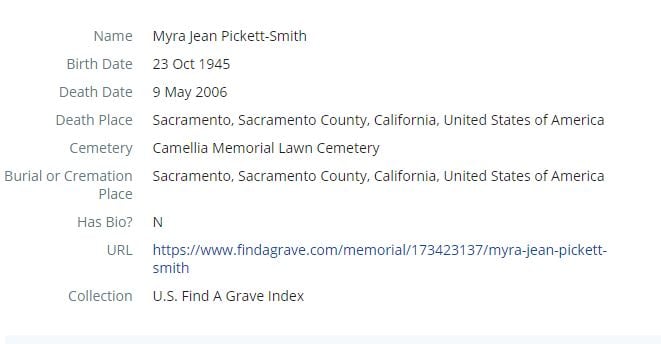
Step 8: View the individual’s story to find out if there is any more information available. You can see when they were born and died and if they had a marriage certificate. If they were married and their spouse passed away, you can see the spouse’s name. Scrolling down lets you see any listed family members such as their parents and siblings.
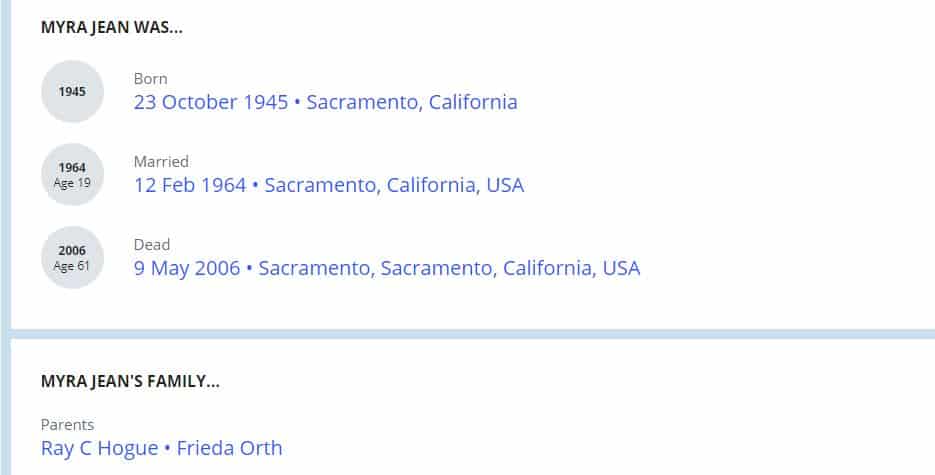
Step 9: Scroll to the bottom of the page to see all the related records that are available. You can click on any record to find more information. Archives.com may list telephone directories that show the deceased’s former address or marriage records that let you view their official marriage certificate.
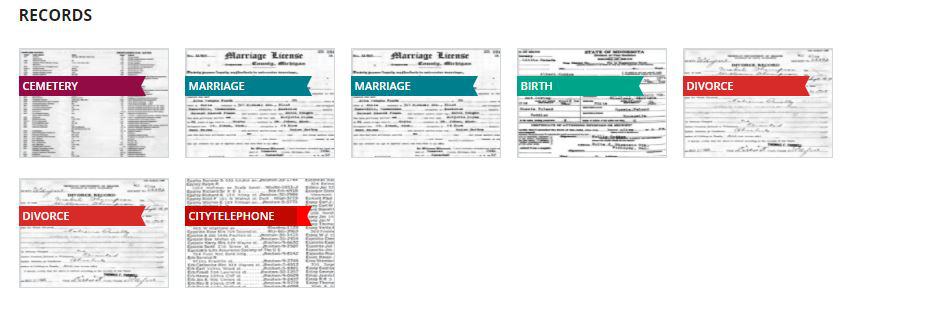
Alternative Sources for California Death Information
Though Archives.com is a good place to look for California death records, there are plenty of other sites you can check. One site that many find useful is the U.S. Social Security Administration. Not only is the Social Security Administration responsible for sending SS payments to Americans, but it also keeps track of death records. You may only find that the record includes the date of the individual’s death. It often shows any death benefits that the administration sent to the deceased’s family.
You can also check the U.S. Social Security Applications and Claims Index
, which shows all claims filed between 1936 and 2007. As more time passes, it will include more recent claims. This database is available through Ancestry.com for those who have accounts through the site. It contains nearly 50 million names and will list the name of the person who applied along with the names of their parents and any dependents they had.
Obituaries are often a great source of information because the loved ones of the deceased write the obituaries that appear in local papers. You see where they were born and worked along with some of their hobbies and interests. Obituaries often include the name of the deceased’s spouse and any children or grandchildren they had. Newspapers.com offers a free trial that allows you to search for obituaries in hundreds of newspapers. You can also check the websites of local papers or see if Google archived past issues.
Cemeteries usually have records that are available to the general public. You have the option of visiting the cemetery and asking about their records or calling over the phone. Another option is the website Find A Grave, which claims it is the largest database of gravesites in the world. With one simple search, you can see everyone listed who shares your last name. Volunteers share the information that they find on headstones and will occasionally take and upload photos of the headstones. This site helps you verify that the information you got on your own or from your family matches the official information.
County and city courthouses can also help you find all the records that you need. California has probate records that date back to before the 20th century. Early records will often list the name of the deceased’s and any assets they had as well as where those assets went after they died. This can help you find the names of their dependents and loved ones. Modern records may also include a date and location of death. You should check with the county where the person died as some offer online archives that allow you to view records without making an in-person appointment.
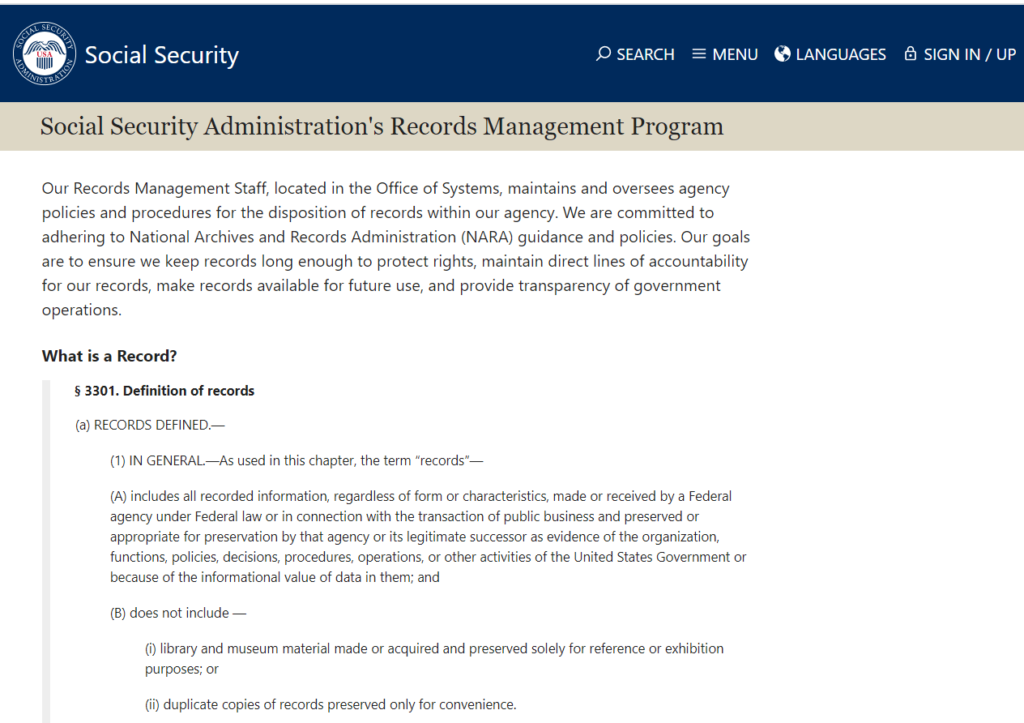
If you know where the person lived but aren’t sure when they died, check the city directories. Before phone books, directories allowed people to find others. Unlike phone books that only list the person’s name and address, directories often list the jobs they had and their spouse’s name. When the head of the household passed away but their spouse wanted to remain listed, the directory would note that the head of the household was “deceased” or list their spouse’s name as a widow or widower. Most libraries have city directories available and may archive the books.
Tax records date all the way back to the 18th century and include the names of people who worked in the area. California records from the 18th century often list the name of the individual. The records from the year after they died will show that they passed away. Modern records simply remove the individual’s name to show you that they didn’t survive the previous year.
Both libraries and courthouses in California offer public access to tax records.
We also recommend looking at any bibles that your family had along with churches your ancestors attended. Family bibles are a good source of information because past generations used them to keep track of their families. You can see the exact dates when people married and died and when they had kids. Church records contain similar information. You may want to check with churches outside of California if you had family who lived in more than one state.
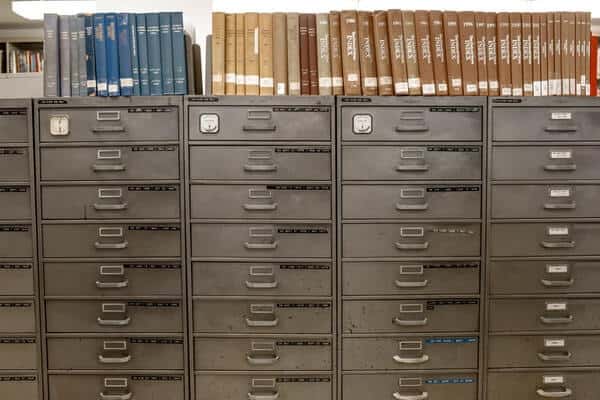
What Information Do You Need to Run a Death Records Search?
You can use as much or as little information as you want to search for California death records. The website that we showed you how to use requires just the deceased’s name. If you want to find multiple ancestors, you might search with only your last name. The site lets you search for exact matches and similar names. It also allows you to add the deceased’s first name and middle name along with their maiden name.
All of the other information that you can add simply narrows down the search results shown to you. If you know the location where the individual died, you can enter it. This includes the city or county where they lived and died. You may want to enter the year when the person was born or died. This helps you view people who died in specific years. We recommend expanding your search to include more than one year as you might not have the exact year.
Should I Hire a Finder to Conduct the Death Records Search?
Professional genealogists are people who can help you learn more about your family and ancestors. Many people think that they need to hire a finder to conduct their searches. They think that the process takes a lot of time and will require hours in dusty archives. Thanks to modern resources, you can now find much of the information that you need while working from home. Professional finders charge an average of $2,700 to conduct your research. The price rises if they need to travel. Working with a professional finder is sometimes helpful because they have memberships and access to sites that you can’t use. Though you need to decide if hiring one is worth the price, most find that they can easily access the California records that they need without any help.

Can You Order Death Records Certificate?
You can usually order a California death certificate, even if you don’t live in the Golden State. To order a copy, visit the California Department of Public Health. This is the government organization responsible for keeping track of public records. It has a permanent collection that includes death records and certificates from everyone who died in the state since July of 1905. You can print a form and fill it out to request a record, which can take up to 12 weeks. California also offers an electronic submission form that you can complete online. Both types of requests can get copies sent to you in 10 weeks or less. It costs $21 to process your request.
If you have free time and live in the area, you can also visit the County Clerk or Recorder. You can only request a death certificate from the county where the deceased died. Most offices have regular business hours and can request your request on the same day. This means that you can visit in the morning and get a copy of the death certificate by the end of the day. Some offices take longer to process requests, which is why you may want to call before your visit.
California Death Records FAQ
What is an Official Death Certificate?
An official death certificate is one that comes directly from the state government or a similar organization. It lists the deceased’s name and address along with their dates of birth and death. In cases where the coroner handles the case, the certificate will also list the deceased’s cause of death. You can see any children the individual had or their next of kin, too. Though some of the information shown comes from their family, other information comes from the coroner or doctor who pronounced the individual’s death.
Who Can Request California Death Certificates?
California has restrictions that limit the type of people who can request official death certificates. You can request one as the deceased’s spouse or an immediate family member such as a child or sibling. The state will also process requests from legal representatives and courts as well as legal guardians and custodians. If you have authorization from an immediate family member, you can also request a death certificate.

What is the Cause of Death?
Most modern death certificates list the individual’s cause of death. This is the condition or incident that led to their death. The line on the certificate may mention a specific reason such as a heart attack, but it can also list homicide or show an accidental death. You may see several other lines that include any things that contributed to the individual’s death. The death certificate might show heart disease as the primary cause of death and diabetes or kidney failure as a contributing cause.
How Long Does it Take to Find California Death Records?
The amount of time that it takes to find death records in California will depend on the type of records that you need. While the California Department of Public Health takes 10 weeks or longer to send a certificate after you request it, it often takes longer when the office is busy. There is an expedited option that helps you get the certificate faster, but you need to pay extra for this service. You can find other types of death records such as those available from courthouses and churches in hours after you start your search.

Find Death Records in California
The Golden State maintains as a way to make sure that it has accurate voting and tax records. When someone passes away, the state can contact their family about any taxes they owe. Family members can use those records when going through probate. You may want to check records to learn more about your family, too. They help you view where people lived and died and the dependents and jobs they had. Our ultimate guide to California death record searches will help you find any type of record that you might need.
Disclaimer: OurPublicRecords mission is to give people easy and affordable access to public record information, but OurPublicRecords does not provide private investigator services or consumer reports, and is not a consumer reporting agency per the Fair Credit Reporting Act. You may not use our site or service or the information provided to make decisions about employment, admission, consumer credit, insurance, tenant screening, or any other purpose that would require FCRA compliance.

Copyright © 2024 · OurPublicRecords.org · All Rights Reserved